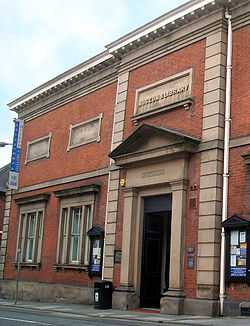Warrington Museum & Art Gallery
| Warrington Museum & Art Gallery | |
|---|---|
|
Entrance to museum | |
| Location | Bold Street, Warrington, Cheshire, England |
| Coordinates | 53°23′14″N 2°35′45″W / 53.3871°N 2.5959°WCoordinates: 53°23′14″N 2°35′45″W / 53.3871°N 2.5959°W |
| OS grid reference | SJ 604 880 |
| Built | 1855–57 |
| Built for | Warrington Corporation |
| Architect | John Dobson |
| Governing body | Culture Warrington |
Listed Building – Grade II | |
| Designated | 4 April 1975 |
| Reference no. | 1161270 |
 Location in Cheshire | |
Warrington Museum & Art Gallery is on Bold Street in the Cultural Quarter of Warrington in a Grade II listed building that it shares with the town's Central Library. The Museum and the Library originally opened in 1848 as the first rate-supported library in the UK, before moving to their current premises in 1858.[1] The art galleries were subsequently added in 1877 and 1931.[2] Operated by Culture Warrington,[3] Warrington Museum and Art Gallery has the distinction of being one of the oldest municipal museums in the UK and much of the quintessential character of the building has been preserved.
Architecture
The museum and art gallery were built between 1855 and 1857 to a design by John Dobson. The building is constructed in brick and stone and is in two storeys. It is recorded in the National Heritage List for England as a Grade II listed building, having been designated on 4 April 1975.[4]
Collections
The museum's collection was originally based upon the collection of the Warrington Natural History Society but it has since grown and now includes a wide range of subjects such as ethnology, egyptology, geology, Roman Britain, pottery/ceramics, botany, fish, amphibians, reptiles, the Civil War, local industries, birds and mammals, and glass.[5] The building also houses a collection of around 1,000 paintings, (oils, watercolours and prints) from the 19th and early 20th centuries, many of which are on display in the mezzanine Art Gallery on the 2nd floor. One of the most famous works in the collection is Between The Tides (1901) by Walter Langley, acquired in 1966. On the first floor there are two temporary galleries, one large and one small, which frequently display travelling exhibitions and the work of local artists and events relating to the community.[6]
See also
References
- ↑ Warrington Library, accessed 2013-05-51
- ↑ Art Guide Art Guide.org, accessed September 2008
- ↑ Culture Warrington website, accessed December 2012
- ↑ Historic England, "Museum and Art Gallery,Warrington (1161270)", National Heritage List for England, retrieved 12 April 2015
- ↑ Warrington Museum & Art Gallery - Collections, accessed 11 July 2012
- ↑ Warrington Museum & Art Gallery - What's On, accessed 11 July 2012
